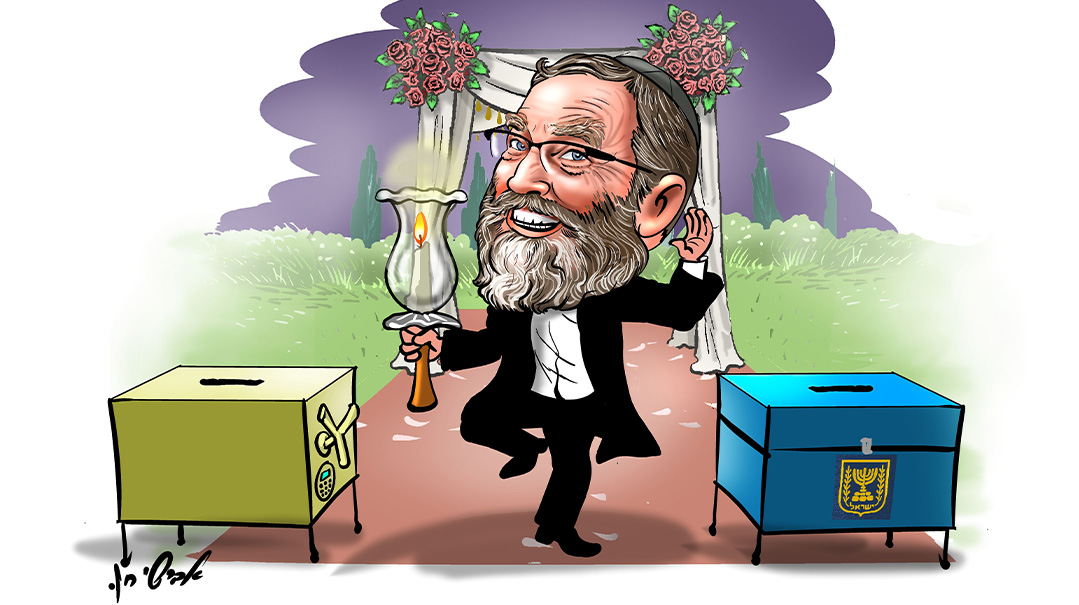Dancing at Two Weddings

You know you’ve made a stir when you make front-page headlines in the leading weeklies of both the secular and chareidi communities

Perhaps more than anyone else, Degel HaTorah chairman Moshe Gafni is a fixture of the Israeli political scene. First elected in 1988, he is the 24th Knesset’s longest-serving MK.
While most Israeli politicians view the Knesset as a springboard for higher office, Gafni — his 33-year tenure interrupted only by a stint as deputy minister in 1990 — has always seen Knesset activity as the ideal public service. He has spent most of the past decade chairing the Finance Committee, arguably the Knesset’s most important committee, with its finger on the pulse of the Israeli economy.
But even as a veteran politician, you know you’ve made a stir when you make front-page headlines in the leading weeklies of both the secular and chareidi communities.
And that’s exactly what happened last week, with both the Hebrew Mishpacha and Yedioth Ahronoth prominently featuring Gafni’s statement about the day after the elections: “If Netanyahu’s right-wing bloc doesn’t have 61 seats, we’ll have to rethink our position and consult gedolei haTorah.”
To understand how the chairman of Degel HaTorah, a faction that controls four seats, became the star of the campaign launch season, we have to get into the spirit of Shlomo Hamelech Street, Bnei Brak, where the popular Armonot Chen complex and several other event halls are located. So get into the spirit and join us for Gafni’s dance at two weddings.
The divisiveness characterizing the right-wing bloc in the past year didn’t spare the chareidi parties, which had to get used to life in the opposition after six years of enjoying the perks of office.
Shas chairman Aryeh Deri staked out the militant line, refusing to associate with coalition members in any way. The traditional distinction between the harsh rhetoric employed in the plenum and the friendships forged in the Knesset cafeteria faded away. At a recent celebration for his grandson’s bar mitzvah, Deri invited Netanyahu and opposition lawmakers, but pointedly left out coalition members.
In Agudas Yisrael, the chassidic wing of UTJ, two representatives tried to keep up a working relationship with such ministers as Matan Kahana, who advanced reforms of kashrus and conversion, but the litvish Degel HaTorah wing criticized these overtures harshly and backed Deri’s line of not even speaking with government ministers.
This approach took a turn recently. At Gafni’s birthday party, held before the dissolution of the Knesset, Yesh Atid chairman and now prime minister Yair Lapid was among the invitees. At the wedding of Gafni’s granddaughter, held days after the Knesset was dissolved, government ministers were among the guests, with Transportation Minister Meirav Michaeli, who supports public transportation on Shabbos, dancing with the kallah in the ezras nashim.
Gafni received criticism for this from within his own camp, with the party mouthpiece Yated Ne’eman republishing an old letter that was seen as a public rebuke to Gafni. In an interview with Mishpacha, Gafni explained where things went wrong.
Why did you break the ban and lend a hand to the legitimization of the government’s ministers, we asked Gafni.
His response? It’s a longstanding political norm. Political rivalry doesn't spill over into personal life, and functional interpersonal relationships are maintained between representatives of opposing political parties. In the course of the interview, Gafni reiterated his support for Netanyahu, but added the newsworthy qualification about rethinking his options should Netanyahu fail to muster a majority.
For the sake of Mishpacha’s English readers, I asked him what he has to say to chareidim in Israel and abroad who were appalled by the terminology used by chareidi MKs, including Gafni himself, over the past year? For example, he described former prime minister Bennett as “stupid,” Religious Affairs Minister Matan Kahana as a “punk” and “Antiochus,” and Communications Minister Yoaz Hendel as a “poritz.”
“I admit that I contributed to the escalation of rhetoric and used terms that I hadn’t used in 33 years in politics,” Gafni said candidly. “I did it deliberately, because I realized this was the only way to communicate the gravity of the government’s actions and bring it down, as indeed happened.
“At the same time, you have to talk to everyone in the Knesset, and aside from three ministers who harmed the chareidi community, I kept up my friendships and even invited coalition members to the wedding.”
For over three decades, Gafni has managed to keep his balance and stay at the top of Degel HaTorah. If, come election day, the Israeli electorate doesn’t deliver a verdict for the fifth time in a row, Gafni will have to muster all his energy and ability to make it through the last dance.
(Originally featured in Mishpacha, Issue 919)
Oops! We could not locate your form.






